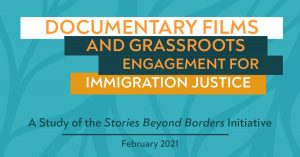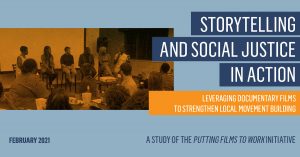For over 20 years, Working Films has built partnerships between documentary filmmakers and grassroots leaders to advance social justice and environmental protection. From shifting our decision-making power to organizers who are directly impacted by the issues we are working on, to ensuring that we only work with filmmakers who are centering accountability as a core value in their craft — our efforts have evolved over the last two decades. This is because we believe in the power of reflection and continual evaluation of our practices and processes.
As organizers, we know that reflection and evaluation can sometimes slip through the cracks. When capacity is stretched, it’s often the first thing to go. We also know that to get closer to an equitable and just world, we must constantly examine our efforts – what went well and what went wrong. We have to always ask ourselves: in what ways could we better imbue our theory of change and our core values into all of our work? Then we must retool and give it another shot, innovate to improve.
Since we believe evaluation is a crucial step in progress, we are beyond thrilled to have partnered with the Center for Media & Social Impact (CMSI) to report out from two of Working Films’ projects: Stories Beyond Borders and Putting Films to Work. Both of these initiatives were born from rumination about our past approaches to audience engagement followed by innovative program changes aimed at better resourcing organizers with films and the skills to use them.
 The first report focuses on Stories Beyond Borders, a film series and power-building initiative that broadens the narrative about who is impacted by racist, inhumane immigration policies and shows people organizing in response. Curated by our partners at NAKASEC, The National Domestic Workers Alliance, United We Dream, and the UndocuBlack Network, these five short films lift up real stories of strength, while illustrating ways people can give their time, energy, and resources to support immigrant-led organizing. We launched Stories Beyond Borders in 2019 to support local efforts for immigrant justice in communities across the United States. In total, 45 screenings were held in 43 cities and 15 states between September 2019 and March 2020. “Documentary Films and Grassroots Engagement for Immigrant Justice,” examines how this project engaged communities around an ideologically polarizing issue and how inclusion in the program impacted participating filmmakers.
The first report focuses on Stories Beyond Borders, a film series and power-building initiative that broadens the narrative about who is impacted by racist, inhumane immigration policies and shows people organizing in response. Curated by our partners at NAKASEC, The National Domestic Workers Alliance, United We Dream, and the UndocuBlack Network, these five short films lift up real stories of strength, while illustrating ways people can give their time, energy, and resources to support immigrant-led organizing. We launched Stories Beyond Borders in 2019 to support local efforts for immigrant justice in communities across the United States. In total, 45 screenings were held in 43 cities and 15 states between September 2019 and March 2020. “Documentary Films and Grassroots Engagement for Immigrant Justice,” examines how this project engaged communities around an ideologically polarizing issue and how inclusion in the program impacted participating filmmakers.
Read the full Stories Beyond Borders report here.
 The second report from CMSI focuses on Putting Films to Work, a year-long training institute for Georgia-based nonprofits that helped organizations leverage the power of documentary film to advance their organizing, educational, and advocacy goals. Eight organizations were selected to be part of this training cohort, including The Counter Narrative Project, Georgia Appleseed, Georgia Justice Project, Georgia Asylum and Immigration Network (GAIN), Housing Justice League, LaGender Inc, Living Room Inc, and Quest Communities. The organizations selected for Putting Films to Work spanned a range of communities and issue areas – from resources for Black trans women, to affordable housing access, to services for immigrants and refugees. Putting Films to Work launched in April 2019 with a two-day convening that introduced participating organizations to Working Films’ curriculum centered on the eight elements required to put films to work followed by an implementation phase in which organizations designed and carried out screenings events with support from Working Films. Storytelling and Social Justice in Action, explores this initiative and shares learnings that can inform how other nonprofits use documentaries to achieve their goals.
The second report from CMSI focuses on Putting Films to Work, a year-long training institute for Georgia-based nonprofits that helped organizations leverage the power of documentary film to advance their organizing, educational, and advocacy goals. Eight organizations were selected to be part of this training cohort, including The Counter Narrative Project, Georgia Appleseed, Georgia Justice Project, Georgia Asylum and Immigration Network (GAIN), Housing Justice League, LaGender Inc, Living Room Inc, and Quest Communities. The organizations selected for Putting Films to Work spanned a range of communities and issue areas – from resources for Black trans women, to affordable housing access, to services for immigrants and refugees. Putting Films to Work launched in April 2019 with a two-day convening that introduced participating organizations to Working Films’ curriculum centered on the eight elements required to put films to work followed by an implementation phase in which organizations designed and carried out screenings events with support from Working Films. Storytelling and Social Justice in Action, explores this initiative and shares learnings that can inform how other nonprofits use documentaries to achieve their goals.
Read the full Storytelling and Social Justice in Action report here.
We are grateful for moments of pause where we can reflect and evaluate our work. These reports not only provide key takeaways, but a roadmap of the work still to come. The learnings shared here are already informing new efforts at Working Films, and we hope they will prove equally valuable for others committed to using film to advance social justice.
Thank you to the filmmakers, audience members, and organizers with whom we had the pleasure of working on these projects and the funding partners whose support made these two programs and their evaluation possible, including the Arthur M. Blank Family Foundation, the John D. and Catherine T. MacArthur Foundation, Katybelle LLC, Participant Media, Perspective Fund, Southern Partners Fund, and the Z. Smith Reynolds Foundation.
